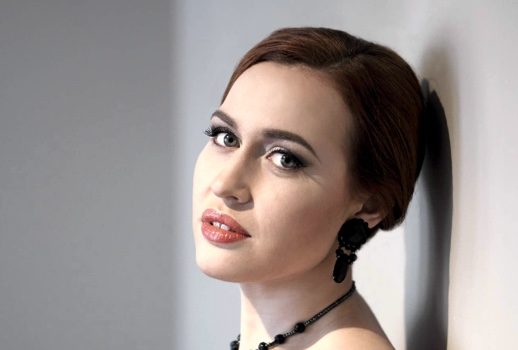
Elena Stikhina, whose Suor Angelica “filled the house with arresting urgency.”
The Met has recently been commemorating the centenary of its world premiere of Puccini’s three-part Il Trittico but I didn’t attend the revival of its behemoth Jack O’Brien production until Wednesday in order to catch several significant cast changes.
While those new performers were all-in-all successful, the long evening didn’t achieve the degree of celebration it should have.
Il Tabarro, the opener, proved the most potent of the three. Douglas W. Schmidt’s enormous, intricately detailed set remains the star of the show although its gargantuan proportions necessitated an intermission of nearly 45 minutes to change over to Suor Angelica’s more modest convent garden.
The irony is that nearly all of the action takes place on a very small portion at the front and Jules Fisher and Peggy Eisnhauer’s evocative sunset lighting became so pitch-black by the violent conclusion that the Luigi-Michele confrontation and the horrific encounter between the latter and Giorgetta were nearly impossible to see.
The newcomers to the cast were Tatiana Melnychenko and Lucio Gallo as the unhappily married couple. The Ukrainian soprano had made her Met debut two years ago as Abigaille in Nabucco and some stentorian high notes (if not always perfectly on pitch) explained her usefulness in that sort of heavy repertoire.
However, as Giorgetta she tellingly revealed the character’s vulnerable side. Dowdy but still attractive, she dutifully went through the motions of being the good wife but clearly yearned for the freedom that she thought her affair with the young stevedore Luigi promised.
Her touching interactions with Marcelo Álvarez and Gallo were the opera’s strongest moments. The tenor, much slimmer than the last time I saw him, seemed recovered from an illness that had plagued him earlier in the run and belted with unsubtle ardor. As usual he punched out his high notes and strenuously semaphored both his restlessness to move on and his fatal infatuation with his boss’s wife.
I was shocked to realize that I had first heard Gallo at the Met 27 years ago as Guglielmo in Così fan tutte. In the third decade of his career his burly baritone remains a potent instrument, last heard at the Met as Jack Rance in La Fanciulla del West during its centenary run in 2010.
A particularly poignant aspect of his Michele is that Gallo is still a handsome man and those aging good looks suggested that the ruined marriage at the center of the opera might have actually been a satisfying and happy one before the death of their child.
Gallo brought a seemingly touching tenderness to his attempt to convince Giorgetta to try again but his biting “Squaldrina!” chillingly suggested that it had all been cruel, desperate play-acting.
Bertrand de Billy’s conducting did an efficient job at the atmospheric scene-setting of the early scenes but didn’t always rise to the erotic ecstasy of Giorgetta and Luigi’s furtive encounters or to the shocking murder that concludes the work.
A friend of mine told me the other day she was avoiding a new film because it was qualified as “misery porn” and I wondered if Puccini’s following episode didn’t qualify too. But Angelica featured the factor that probably brought many to the house that evening: the Met debut of buzzed-about Elena Stikhina.
The young Russian soprano’s repertoire reveals a startingly wide range: from Mimi to Salome, from Micaela to the Forza Leonora. I recall first hearing about her when a couple years ago she jumped in at the last minute to replace a MIA Anna Netrebko at the Paris Opéra as Tatyana in Eugene Onegin to wide acclaim.
As Puccini’s tragic nun, her first lines made one sit up—the big voice filled the house with arresting urgency. As the opera progressed that initial impression didn’t dissipate but one wished for more detail and nuance, more care for the words and the heroine’s shifting moods.
“Senza mamma,” one of the composer’s most gripping arias, made its expected effect but unsubtly. Forte high notes rang out more strongly than softer ones which occasionally faltered.
She ably performed the vivid melodrama of Angelica’s stark suicide—ripping off her cowl and lurching toward the lurid MGM vision of her dead son—and she received the expected wild ovation. But I wasn’t particularly moved as she indicated her character’s crushing vulnerability rather than embodied it.
The debut suggested, though, that in the right roles and in more advantageous circumstances—stage rehearsals, etc.—she might prove a worthwhile addition to the Met’s roster.
After another endless intermission the performance sputtered to an end uneasily close to midnight with a grossly broad and unfunny Gianni Schicchi starring Placido Domingo who is currently celebrating his golden Met anniversary.
Many accolades have of course been tossed at the would-be baritone as a result but I’ve grown increasingly frustrated by his recent spate of inadequate performances.
Over the past decade or he’s struggled with painfully unwise excursions into the 18th century in The Enchanted Island and Iphigénie en Tauride and failed to convince as a Verdi baritone in Ernani and Luisa Miller.
Puccini’s rascally schemer was the latest role in which Domingo came up short having neither the comic chops nor the pungent lower voice necessary to dominate the action. True there were moments when the decades melted away and he sang beautifully in a full healthy tenor but this Schicchi of course was not the place for it.
And better not to speak of his mediocre conducting which recurs at the Met with dismaying frequency and is due to return next with Aïda in February.
It seems unlikely we will see Trittico again anytime soon but this generally adequate, occasionally effective revival was not quite the anniversary present this challenging trio of operas deserved.



